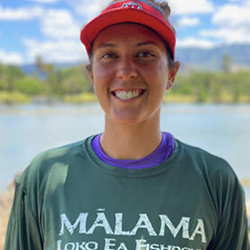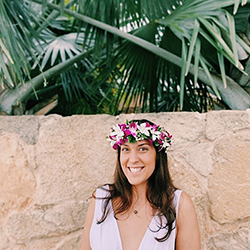Community Engagement Spotlight: McKenna Granato
McKenna Granato is a recent ‘21 graduate of the U of U Environmental Humanities Program. Her research explored Indigenous sovereignty and everyday acts of resurgence at the Loko Ea in Hawai’i. McKenna spent a summer working at Loko Ea, and that community engagement experience greatly informed her project. Her final project also served as a way for her to explore her responsibility and identity as a Hawaiian. In May, 2021, I talked with McKenna about her research and experience working at the Loko Ea.
Brooke: What was your final project for the Environmental Humanities Program? What role did community engagement play?
 McKenna: My project focused on restoring Indigenous food systems and how that contributes
to food sovereignty and overall sovereignty. The first chapter goes into the everyday
life and everyday acts of resurgence happening at the Loko Ea Fishpond, while also going into depth about what everyday acts of resurgence looks like in
different areas as well. Then the second chapter looks at settler colonial institutions
and how it's difficult for these Indigenous food systems to work and produce food
under the settler colonial law, institutions, and legislation that control them. In
Hawai’i specifically, it's a land grabbing issue. The state of Hawaii just wants to
build and develop for outside buyers. When that happens, we lose our food production
systems and we can’t feed ourselves. I think settler colonialism is just all about
money. There is no community engagement there. I think within Indigenous cultures,
you don't just work for yourself, everyone works together to feed everybody. So I
also highlight how everyday acts of resurgence are resilient against those settler
colonial institutions that are trying to push Indigenous practices off the land.
McKenna: My project focused on restoring Indigenous food systems and how that contributes
to food sovereignty and overall sovereignty. The first chapter goes into the everyday
life and everyday acts of resurgence happening at the Loko Ea Fishpond, while also going into depth about what everyday acts of resurgence looks like in
different areas as well. Then the second chapter looks at settler colonial institutions
and how it's difficult for these Indigenous food systems to work and produce food
under the settler colonial law, institutions, and legislation that control them. In
Hawai’i specifically, it's a land grabbing issue. The state of Hawaii just wants to
build and develop for outside buyers. When that happens, we lose our food production
systems and we can’t feed ourselves. I think settler colonialism is just all about
money. There is no community engagement there. I think within Indigenous cultures,
you don't just work for yourself, everyone works together to feed everybody. So I
also highlight how everyday acts of resurgence are resilient against those settler
colonial institutions that are trying to push Indigenous practices off the land.
In terms of community engagement, I spent a couple months working at the Loko Ea that is highlighted throughout my thesis. It's in the moku of Waialua on Oahu. They do a lot of community engagement. They do a monthly food drive with the North Shore Food Bank. They prepare food in an emu, which is a traditional way of preparing food, and then they make plates and hand them out to the community members monthly. That's been going on since COVID. Pre-pandemic, community workdays would happen once a month. That allowed community members to be a part of the work at the fishpond and provided them with an opportunity to learn about the land that they live on. It fosters sense of place while also getting people involved in the actual food that they may eat. After COVID, community workdays halted for a while. Loko Ea then did Ohana work days where you could bring your family to the fish pond but you'd have to sign up because of COVID issues.
Brooke: How did working at Loko Ea impact your project and inform your research? What was your day to day experience like?
McKenna: Working at Loko Ea completely informed my project. I was an intern for the summer. There were staff members who specialized in land farming, aquaculture, and water quality. Everyone was learning how to work a fishpond under Indigenous practices without using Western instruments. Loko Ea actively incorporates cultural practices within every part of their work. Those everyday acts of resurgence play a big role in decolonizing the land and the water and the practices.
We would get there around seven in the morning. Then the first thing we would do is Nā ‘aumakua, which is like an oli to the pond and to our ancestors and to the mo’o, protector of the pond, which was Lani Wahine. Then we would go and do our daily maintenance tasks, which included watering the gardens and cleaning out the sluice gates. Then we would do kilo, which is a big practice in all of Hawai’i that basically means observation. Native Hawaiians were so good at observing the environment and making changes based on those observations. They could remember the weather from two weeks ago and be like, oh, this is happening in the fishpond because of that weather from two weeks ago. So every morning we would practice kilo and just try to get better at recognizing what's happening and why it's happening. First, we would go off on our own, and then we would talk about what we saw and come up with conclusions on why that's happening. Or we would all observe one specific spot, and then see how our minds work differently observing that one specific area. Then we would just go into daily work. I think the daily tasks, like pulling weeds and eradicating invasive fish, is a huge everyday act of resurgence. That constant removal of invasive species is crucial.
We’d also have lessons on particular days. Fridays were ‘Fun Fridays,’ and that's when we were able to learn different practices. One of my favorite Fridays was when we learned how to throw net. Then, every other Wednesday, Uncle Buddy, who is on the Board of Directors and in charge of permits, would sit down with us and teach us about the pond. He's very well known in the fish pond community. We would talk about our kilo or observations to him, and he would teach us.
Talking about it makes me want to go back already.
Brooke: What does everyday acts of resurgence mean to you?
McKenna: In my own words, that means everyday practices that work to decolonize, in this case, food systems, but it can be anything really. Noelani Goodyear–Ka‘ōpua describes it well. She essentially says it's the day after day, generation after generation practices that will bring us sovereignty and will decolonize our land and our water and our practices. It's not one big thing or one big law that will change and we will get sovereignty and we'll get our practices back, it's the everyday actions of resurgence that will help to revive our practices and continue forward.
Brooke: How did the EH program support your community engaged research? What specific courses or materials inspired your project?
McKenna: In Brett's Foundations class, we read a book called The Ocean of Life: The Fate of Man and the Sea by Callum Roberts. That book talks about a bunch of issues in the ocean—overfishing, pollution, how the ocean itself sequesters carbon. So that got me more interested in the ocean. I also have a genealogical background in the ocean. My ancestors worked closely with the water. So I think that is what influenced me a lot in picking fishponds.
I knew I wanted to work with Indigenous food systems, particularly from home. Previously, I actually didn't have any experience in fishponds in Hawai’i. I've worked in kalo (taro) fields before, but I never really had that experience in fishponds. In the Hawaiian perspective, taro fields and fishponds are all connected.
Brooke: How did your personal story and ancestry inform your project? 
McKenna: Before I came to Utah, I went through that journey of trying to figure out my genealogy and what that entails for my responsibility as a Hawaiian. When I was in undergrad, I decided to dive deeper into my genealogy. My auntie had done that a while ago, so she had a lot of documentation already. I just sat and talked with her.
But for this project, I definitely dug into it again. It's a difficult process. We know a lot about my great grandma's side, but not a lot about my great grandpa's side. I tried to dig through the state archives, but it was very hard. My great grandpa's mother died at a really young age and she was full Hawaiian. Right after colonization, Hawaiians didn't understand the concept of paperwork and filing, like needing to file a birth certificate. They didn't need to understand that before colonization. But it did become difficult when my great grandpa's mom died at such a young age.
I am a descendant of Kupanihi, who was a big voyaging chief. So I have that connection with the ocean. But honestly, everything in Hawai’i is pretty connected. I think I just wanted to learn more about where I come from. So that's a lot of the reason why I wanted to work at a fishpond. I still have so much more to learn.
